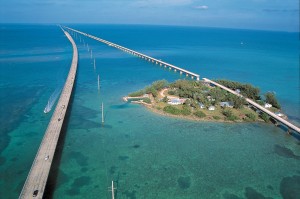
Just over two miles west of Marathon, Pigeon Key’s five acres housed more than 400 workers who built Henry Flagler’s railroad in the early 1900s. The island was a base camp with a commissary and one-room school during the bridge’s construction from 1908 to 1912. Following its completion, maintenance crews continued living on Pigeon Key.
On Saturday, Jan. 14, the public is invited to travel back in time to the 1900s and explore Pigeon Key, one of the Keys’ landmark railroad heritage sites, largely unchanged compared with other islands in the Keys.
A day of family fun is planned from 10 a.m. to 4 p.m., with attractions including snorkeling, period games for children such as sack races and bobbing for apples, treasure hunts, woodworking, kettle cooking, a sing-along or two, and square dancing. Live music, entertainment and featured foods of the early 20th century round out the Flagler-era celebration.
Historical tours are to be offered of the island’s museum that chronicles the construction of the final installment of Henry Flagler’s Key West Extension of the Florida East Coast Railroad. Many of Pigeon Key’s original railroad buildings and houses dating to 1909 still stand.
Entrance to the event is free, but a $5 to $10 donation to the nonprofit Pigeon Key Foundation is appreciated.
Pigeon Key is accessible by ferry from a visitor center at Knight’s Key on the west end of Marathon, and boats are to run continuously during the event. Visitors also can walk or bike to the island along a scenic 2.1-mile portion of the Old Seven Mile Bridge. In addition, limited dock space is available for personal boats.
Pigeon Key information: www.pigeonkey.net or 305-743-5999
Flagler Centennial Celebration: www.FlaglerKeys100.com
Marathon visitor information: www.fla-keys.com/marathon or 1-800-262-7284
Social: facebook.com/floridakeysandkeywest • twitter.com/thefloridakeys • youtube.com/FloridaKeysTV